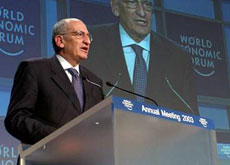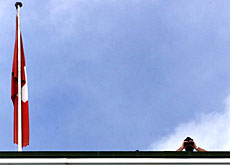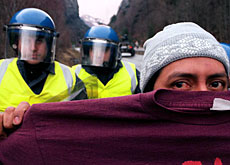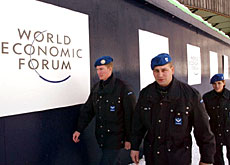Davos opens amid talk of war

The Swiss president, Pascal Couchepin, has formally opened the World Economic Forum's annual summit in Davos - with a stern warning against a war in Iraq.
Couchepin told the 2,000-plus summit participants from over 100 countries that a war could trigger a resurgence of the Israeli-Arab conflict.
“Regional destabilisation could have serious consequences for the rest of the world,” he said.
As expected, the spectre of a war in Iraq all but dominated the opening day of the summit – now in its 33rd year.
Klaus Schwab, president of the forum, also referred to the tense world situation in his opening address.
“Never before, in the 33-year-old history of the World Economic Forum, have we been in a situation where the world has been so fragile, so complex, and so dangerous as this year,” he said in his speech.
He added that the forum programme had to acknowledge the current situation. It tackled, he said, a broad range of complex problems, which are a “mirror of the global agenda today”.
US criticism
Couchepin also used his welcome speech to restate Switzerland’s belief that the use of force in Iraq should only be a last resort “once all other possible means of persuasion have been exhausted”.
His comments have been seen as a gently-worded rebuke of the United States government, which has vowed to take matters into its own hands should the United Nations fail to challenge the Iraqi leader, Saddam Hussein.
They were also aimed at the more than one third of participants who have travelled to Davos from the US.
Saddam’s ghost
Concern about Iraq percolated through many of the debates held on Thursday. Many delegates are hoping to use Davos to hammer out possible solutions to the Iraq crisis.
Several high-powered meetings have been organised between key players in the conflict – including the US secretary of state, Colin Powell – who arrives in Davos on Saturday.
Nine prominent Iraqi opposition leaders are also heading to the summit to discuss the prospects for democracy in their homeland.
Schwab was also keen to point out the scope for progress offered by the forum.
“We feel we are living in a new world with new dangers, but let’s not forget the new opportunities,” he said in his address.
The issue has also helped contribute to the general feeling of seriousness that surrounds this year’s summit.
Henry McKinnell – a co-chairman of the summit – told journalists that the threat of war in Iraq was an issue that concerned everyone.
“A short successful conflict could even be positive… by removing the uncertainty of a possible war… and taking the war premium out of the price of oil,” McKinnell said.
Party-free zone
The feel of gloom has prompted conference organisers to cancel many of the lighter elements in the summit programme – such as a gala party, and even a skiing session on Sunday.
WEF summit participants are being greeted by a phalanx of security forces and must negotiate several checkpoints before being admitted to the inner sanctum of the Davos Congress Centre.
Inside the labyrinthine venue – security personnel are everywhere.
Summit regulars have also pointed out that the summit appears less “triumphal” than in previous years – when the Internet bubble helped turn Davos into a boasting chamber for new-economy entrepreneurs.
The agenda this weekend is packed with questions about the lack of trust – and criticism of business leaders’ pay.
Humility, not hubris
Couchepin also acknowledged the “more modest and down-to-earth” nature of Davos in 2003 – although he did urge participants to take time out for some skiing.
“Unfortunately, we have good reason to be [more humble],” he said. “Despite the globalisation of markets, of communication and of mobility there are still more barriers separating us from one another than bridges to connect us.
“While the progress in technology and society has created benefits and winners, it has also brought downsides and created many losers.”
Couchepin urged business leaders to look beyond their responsibility to shareholders.
“[Business] should not focus on maximising profits in the short-term, but rather on optimising them in the long term.
“That requires managers with skills in leadership and a feeling for social responsibility, whose performance is measured against the company’s long-term success.”
The summit continues until Tuesday.
swissinfo, Jacob Greber, special correspondent in Davos
The Swiss President, Pascal Couchepin, opened the WEF summit in Davos with a warning against a war in Iraq, saying that it could trigger a resurgence of the Israeli-Arab conflict.
Many delegates are hoping to use Davos as a platform for discussion on the Iraq issue, and a number of meetings involving key officials have been arranged on the subject.
Nine Iraqi opposition leaders are attending the summit to discuss democratic possibilities for their country.
The possiblity of war has brought a more sombre mood than usual to the summit, and a number of lighter events, such as parties, have been cancelled.

In compliance with the JTI standards
More: SWI swissinfo.ch certified by the Journalism Trust Initiative



You can find an overview of ongoing debates with our journalists here. Please join us!
If you want to start a conversation about a topic raised in this article or want to report factual errors, email us at english@swissinfo.ch.